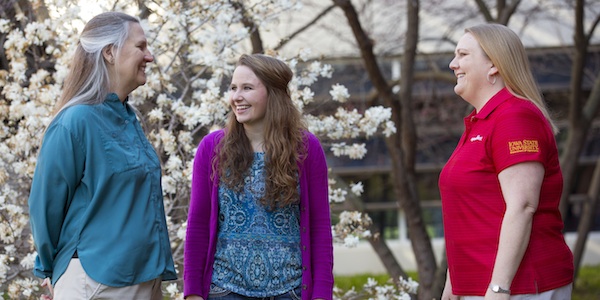
Women in Agronomy Finding a Place of Their Own
Stephanie Zumbach’s office is a busy place. Students drop in to chat about career prospects, course planning, transfer credits and internship possibilities. For many, her office is the first stop on their Iowa State University adventure.
Zumbach (’99 agricultural studies) is a student services specialist in the Depart- ment of Agronomy. She’s also a recruiter, marketer, counselor, mentor and friend to countless students.
A Woman’s Place
As part of her charge to recruit, serve and retain students in the department, Zumbach leads the Women in Agronomy Program.
Kicked off more than 15 years ago, the program provides a safe and open venuefor women to learn, network and thrive. The program is supported by department funds, industry grants and university diversity funds.
“Our agronomy student body is about 33 percent women,” says Kendall Lamkey, agronomy professor and chair. “This program is important because women are underrepresented in production agriculture and we feel women will be important to bringing change to the industry.”
Zumbach lines up a roster of speakers, including many Iowa State alumni, who share their experiences with students, offer facility tours and workshops. Topics include balancing work and family life, unique interview scenarios, practical on-job advice and suggestions for maximizing the student experience at Iowa State.
“This program aims to show women they have a place in agronomy and in agriculture,” she says. “We want to equip them with skills to be successful people, not just successful agronomists.”
Thanks in part to these efforts, the department has seen the number of female undergraduate students double over the past three years.
Elizabeth Widder says Zumbach is known as a friendly and helpful resource for all students in agronomy.
“I’d say she’s like our mom, but everyone knows that’s Mary (Wiedenhoeft). Steph is more like a friend. She’s always willing to help with anything,” Widder says. “When she heard I was really struggling with chemistry my first semester she encouraged me to consider a tutor. She followed up with an e-mail on where to find one and how much it cost. She wanted to connect me with what I needed to succeed.”
Drawn to Iowa State for her love of science “and the agriculture behind it,” Widder made fast friends in the Women in Agronomy program. The junior in agronomy and animal science credits her peer mentor and personal invites from Zumbach for getting her interested in the program. She’s now a peer mentor and president of the Agronomy Club.
What’s the overall message students like Widder take away from the program?
“I’ve learned agriculture is a great place for women,” she says. “Speakers introduce us to all different types of paths. They encourage us to be proactive and self- aware. They give us practical advice for dealing with interview situations, field calls and business travel.”
Zumbach worked for 13 years in the seed industry before joining the agronomy staff. She can speak from experience about working in a predominately male industry.
“I know what it’s like to not have my voice heard at meetings. I’ve experienced some of the same things they’ll be dealing with. They know I support them and can relate,” Zumbach says. “Hearing other women’s stories shows students success is possible. They see what they can aspire to, how they can overcome issues and inspire other women. They know they’re not alone.”
Welcome Home
Helping students find their home in the Department of Agronomy is rewarding for Zumbach.
Coleman Kneifl, an agronomy freshman from Nebraska, says meeting with Zumbach is what helped seal his decision to attend Iowa State.
“My parents and I met with Stephanie during both of my visits to Iowa State University. The second time it was just my mom and I meeting with her. We were concerned about the residence halls and weren’t sure they offered the welcoming home-like atmosphere I was looking for,” Kneifl says. “Stephanie offered to take time out of her schedule to give us a personal tour of Maple Hall and visit some students in the ACES (Agricultural Community Encourages Success) learning community. That visit confirmed Iowa State was the place for me.”
Kneifl joined the ACES learning community as a new student and has been accepted to be an agronomy peer mentor next year. He’ll be assisting new students with their transition to college life.
Zumbach attends recruiting functions like National FFA Convention, Iowa FFA Convention, and various high school events in and out of state. She communi- cates information regarding curriculum to current and prospective students and families.
“I enjoy showing students what a degree in agronomy can do for them. Some people have a very narrow defi- nition of what agronomists do. I try to broaden that definition. I show them how their interest in science, farming, plants, soil, plant breeding or another part of agronomy will translate into a career,” Zumbach says. “Agronomy has nearly a 100 percent job placement rate within six months of graduation.”
I’m an Agronomist
The “I’m An Agronomist” recruitment campaign, which Zumbach oversees, seeks to build pride in the profession and illustrate the diversity among agronomists to inspire prospective students to pursue the field.
“The campaign really challenges me to highlight students with different back- grounds, interests and goals,” Zumbach says. “This results in attracting a diverse group of students for our program.”
Her efforts are making a difference. Agronomy enrollment increased 25 per- cent during the past three years. The department has 335 undergraduates and 316 graduate students.
“Stephanie has been key to both our undergraduate recruiting and our ability to recruit women. We now have as many women in our program as we had total undergraduates when I became chair,” says Lamkey. “This increase in women undergraduates has been due to Stephanie’s efforts and vision.”
In addition to recruitment and retention efforts, Zumbach manages student orientation for approximately 100 incoming freshman and transfer students each year and allocates $90,000 in freshman scholarship awards.




